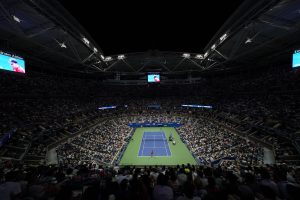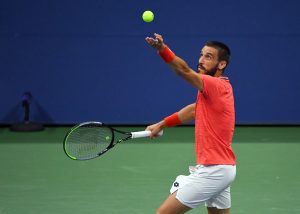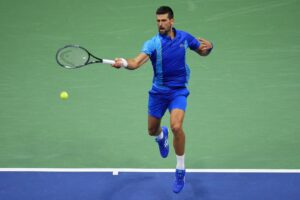“Djokovic” and “Escapologist” don’t quite rhyme, but they are close enough metrically to suggest that in time the great Serb might just acquire a new nickname to go with “The Rubber Man”, the monicker that is a testament to both his freakish physical flexibility and his ability to bounce back from even the most difficult situations. Both phrases convey something of what might just be Novak Djokovic’s single-most impressive skill on a tennis court – put simply, the ability to come back from the dead, or at least the sporting equivalent of being dead. Increasingly, he is demonstrating that he just cannot be defeated on a tennis court, and if that trend continues then he might just achieve the Holy Grail of Tennis and win the Grand Slam – all four Majors – in 2020.
So far this year, Djokovic has already exhibited Lazarus-like qualities not once but twice. First, in the Australian Open Final at the beginning of February, he went two sets to one down against Dominic Thiem and for a time it looked as if his Herculean efforts in the inaugural ATP Cup, in which he led Serbia to another great team triumph (after spearheading their Davis Cup win in 2010), might finally be catching up with him. But then he spectacularly rallied (in both senses of the word) and eventually beat his young Austrian opponent in five sets. Then, in Dubai last week, Djokovic faced four matchpoints against Gael Monfils in the semi-final, and it seemed certain that the Frenchman might finally beat him for the first time ever, only for Djokovic to stave off all four of them and eventually win the match in three sets. He then steamrollered Stefanos Tsitsipas in straight sets in the final to continue his unbeaten start to the new year and indeed new decade.
Of course, even those colossal comebacks pale into insignificance in comparison with what might just be the greatest act of survival on a tennis court ever, namely Djokovic’s victory in the 2019 Wimbledon Final despite Roger Federer serving for the match and securing two matchpoints against him. But just when everyone thought that Federer might finally beat his greatest nemesis (yep, greater even than Nadal) in a Major for the first time since the 2012 Wimbledon semi-final, Djokovic somehow hung tough long enough, first, to break Federer’s serve and then, eventually, to win the match and the title in a fifth-set tie-break, the first ever played in SW19.
Arguably, Djokovic has always been the master of “playing possum” – appearing to be physically spent, or even actually defeated, before somehow leaping back into life. As a young player, he was actually mocked by Andy Roddick for the seemingly endless list of ailments and other physical ticks that he brought onto court. However, that all changed from 2010 onwards, with the diagnosis of his gluten intolerance and subsequent change of diet, after which he “djominated” the next decade in men’s tennis.
It is only really in the last year, since that epic (indeed, scarcely believable) Wimbledon triumph, that Djokovic has again exhibited the ability to come back from the sporting dead. But if he can ally his newly rediscovered ability to impersonate Harry Houdini, the greatest escapologist of them all, to all his other astonishing abilities – the greatest return in the history of the game and arguably the greatest mental toughness ever exhibited in tennis, to name but two – then he really will stand a chance of achieving something that not even his two greatest rivals, Federer and Nadal, have achieved, namely winning a real (i.e. calendar) Grand Slam.
Of course, Djokovic has already won a Grand Slam of sorts, the so-called “Nole Slam” that he achieved in 2016, when he finally won the French Open and thereby held all four Majors at the same time. However, a Grand Slam of sorts is not a Grand Slam at all. The defining characteristic of a real (i.e. calendar) Grand Slam is that it is won in the same year, and not somehow “stretched out” over two years. To do that is still a remarkable achievement, no question, but it is not – emphatically – a real Grand Slam.
That is why the Grand Slam remains the most prized prize in tennis. In the entire history of tennis as an organised sport, which now goes back very nearly 150 years, only two men have ever achieved it: America’s Don Budge, in 1938, when he became the first tennis player of either gender to win the Grand Slam; and of course Australia’s Rod Laver, who extraordinarily won it twice, first as an amateur in 1962 and then, having been banned from playing at the Majors for most of the 1960s after renouncing his amateur status, as a professional in 1969, after the sport itself had finally became fully professional (or “Open”) in 1968.
The fact that neither Federer nor Nadal have even got close to emulating Budge and Laver, despite the fact that statistically at least they are the two greatest male tennis players ever (with 20 and 19 Major victories respectively), shows just how difficult it is to win a Grand Slam. For Djokovic, the greatest obstacle in his path is undoubtedly Nadal in Paris, where the great Spaniard will be bidding for a frankly ridiculous 13th French Open victory, which would put him level with Federer on 20 Major wins. However, Djokovic has already won the French Open, he has also already beaten Nadal on the Paris clay (in straight sets, no less, in the 2015 quarter-final) and at the moment, as demonstrated again in their singles match in the Final of the ATP Cup, he seems to enjoy something of a stranglehold over Nadal in big matches, indeed even in Major matches.
If, and it is obviously still a big if, Djokovic can win the French Open, then he will be set relatively fair for the rest of the Grand Slam, having won both Wimbledon and the US Open multiple times before. Then, if he completes the Grand Slam, he can incredibly top it by winning a ninth Australian Open in Melbourne next year, which would take him ahead of Federer in the All-Time Major stakes – 21 in 21.
All that is for the future, of course. Injury, or a sudden, even inexplicable loss of form of the type that scuppered Djokovic before in 2016 and 2017, could derail even the grandest of Grand Slam plans. But, as he has already proved repeatedly at the highest level, if anyone can achieve the seemingly impossible and win the first Grand Slam of the 21st century, it is Novak Djokovic. And if he does it, then he will surely have proved beyond doubt that he is the GOAT – the Greatest of All Time – and even the most begrudging FedHed or Rafaelite will have to acknowledge it.
Main Photo:






